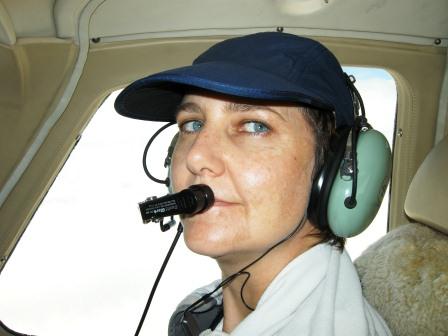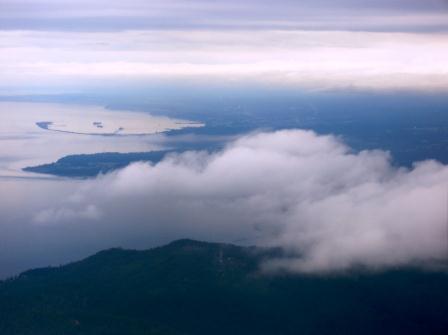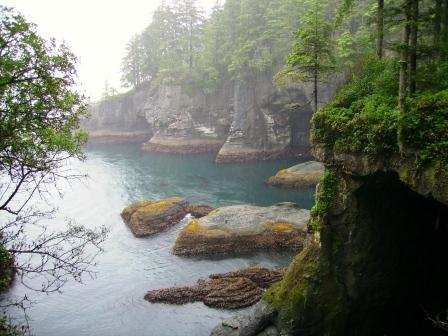Flying the Edge of America:
Cape Flattery, Washington
The next morning, at Fort Stevens State Park in Oregon, Julia and David prepared for departure. Their initial plan was to land at a visual flight rules (VFR) airport in Sekiu, Washington, close to their planned bed and breakfast. However, persistent poor weather forced them to adjust their route, opting instead for William R. Fairchild International Airport in Port Angeles. This airport offered the option of an instrument approach—a crucial safety net given the uncertain conditions at Sekiu.

Arriving early at Astoria Airport, they took off under cloudy skies. The cloud ceiling was high, giving David hope for a smoother flight. However, as they crossed the mighty Columbia River and climbed toward the gray sky above, he quickly realized his optimism had been premature. Instead of an easy ride, they faced a turbulent and unpredictable flight. Ascending above the clouds, they were momentarily greeted by patches of blue sky. The stunning coastline of Oregon and Washington revealed itself intermittently, but as they traveled further north, the clouds thickened, eventually enveloping them entirely.
Their aircraft, Matilda, pushed through high, dense, billowing clouds—unlike the familiar thin marine layers David had anticipated. These formations carried significant turbulence, shaking them violently in the blank expanse of a total whiteout at 6,000 feet above the ground. The experience was deeply unsettling, especially for Julia, who found the relentless bumps particularly unnerving.

Finally, they reached the first major turn of their journey—Cape Flattery—marking a symbolic milestone in their flight around America. Though they were disappointed by the complete whiteout obscuring their view, the progress was reassuring. Upon arriving in Port Angeles, they intercepted the landing beams and descended below the turbulent clouds, finally reaching clear air and executing a smooth landing. Relieved to be on solid ground, they picked up their rental car and headed to their bed and breakfast in Clallam Bay. The breathtaking scenery along the way helped Julia recover from the ordeal. It was a serene way to spend the Fourth of July 2008.
See the video of this flight
Port Angeles exuded a certain bleakness—whether due to the gray sky, the fog, or the heavy presence of the Pacific Ocean. Julia couldn't help but feel it might be difficult to find a well-paying job there, and life could be tough. According to the 2000 census, 13.2% of the population lived below the poverty line, an average rate for the U.S. Yet despite its economic struggles, Port Angeles boasted something irreplaceable: access to the wilderness of Olympic National Park. The park contained expansive old-growth forests, temperate rainforests, untamed coastlines, majestic mountains, and powerful rivers. True to its nature, it rained relentlessly during their visit—an expected characteristic of the Pacific Northwest.

Julia and David ventured to Cape Flattery, the most northwestern point of the contiguous United States. The cape was located within the Makah Nation reservation, where the indigenous people proudly preserved their cultural heritage. Their museum in Neah Bay chronicled centuries of traditions. The Makah had long relied on the ocean for sustenance, with whale hunting central to their survival. In 1855, they ceded much of their land to the U.S. government but retained the right to hunt whales, a practice that halted for much of the twentieth century due to commercial whaling that devastated whale populations. In 1999, after a 70-year hiatus, the Makah once again hunted a North Pacific gray whale. According to the tribe’s website, they now await a government waiver to resume hunting—a tradition deeply rooted in their identity.
Julia and David paid a small fee to enter the reservation, then drove through forested roads to the end of the trail leading to Cape Flattery. Only one other car was parked at the lot, and as they stepped out, rain began to pour. They followed a well-maintained path, its wooden walkways protecting them from muddy terrain. At the trail’s end, they climbed onto a viewing platform, battling torrential rain. A Makah park ranger stood at the site, covered head-to-toe in waterproof gear, eager to answer questions. Her enthusiasm was undeterred by the weather as she guided them on where to spot whales from shore. Despite getting soaked, Julia and David embraced the experience, savoring the sense of accomplishment at reaching their first significant corner of their cross-country journey.
Cape Flattery Video
Continue the adventure in my next excerpt from Flying the Edge of America.